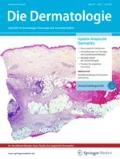Zusammenfassung
Hintergrund und Fragestellung
Psoriasis- und Neurodermitispatienten sind häufig von den psychosozialen Konsequenzen ihrer Hauterkrankungen beeinflusst. Um diese Erfahrungen reliabel zu bestimmen, wurden das Stigmatisierungserleben und die Einschränkung der Lebensqualität dieser Patientengruppen untersucht.
Patienten/Methodik
Die Kurzform des "Fragebogens zum Erleben von Hautbeschwerden" (FEH) mit 23 Items wurde an einer Stichprobe von 463 stationär behandelten Psoriasis- und Neurodermitispatienten validiert. Außerdem wurde der Dermatologische Lebensqualitäts-Index (DLQI) erhoben.
Ergebnisse
Die 4 FEH-Skalen "Beeinträchtigung des Selbstwertgefühls und Rückzug", "Erfahrene Zurückweisung", "Verheimlichung" und "Gelassenheit" konnten durch eine Faktorenanalyse bestätigt werden. Es fanden sich erwartungsgemäß mittelhohe korrelative Zusammenhänge zwischen den FEH-Skalenwerten und dem DLQI-Gesamtwert bei beiden Patientengruppen. Das Stigmatisierungsgefühl und die Lebensqualität einer Subgruppe der Psoriasis- und Neurodermitispatienten mit vergleichbaren soziodemographischen Charakteristika war nicht signifikant unterschiedlich.
Schlussfolgerungen
Die Kurzform des FEH ist ein valides Untersuchungsinstrument zur Erfassung sozialer und psychischer Belastungen von Psoriasis- und Neurodermitispatienten. Mit der Bestimmung des Stigmatisierungsgefühls und der Lebensqualität werden unterschiedliche, sich ergänzende Aspekte der krankheitsbezogenen Belastung von Patienten mit chronischen Dermatosen erfasst.
Abstract
Background and Objective
Psoriasis and atopic dermatitis patients are often influenced by the psychosocial consequences of their skin diseases. In order to assess these experiences reliably, the stigmatization feeling and the quality of life of these patient groups were studied.
Patients/Methods
The short form of the "Questionnaire on Experience with Skin Complaints" (QES) was validated in a sample of 463 in-patients with psoriasis and atopic dermatitis. In addition, the Dermatology Life Quality Index (DLQI) was ascertained.
Results
The dimensions "impairment of self-esteem and withdrawal", "rejection experienced", "concealment", and "composure" of the QES could be confirmed by factor analysis. As expected, middle high correlations between the QES and the DLQI were found in both patient groups. However, the stigmatization experience and the quality of life were not significantly different in a subgroup of psoriasis and atopic dermatitis patients with comparable sociodemographic characteristics.
Conclusions
The short form of the QES with 23 items is a valid instrument for the examination of social and psychic burdens of psoriasis and atopic dermatitis patients. The recording of the stigmatization feeling and of the quality of life determines different, supplementary aspects of the illness-related stress of patients with chronic skin diseases.

Literatur
Augustin M, Amon U, Bullinger M, Gieler U (2000) Empfehlungen zur Erfassung von Lebensqualität in der Dermatologie Dermatol Psychosom 1:76–82
De Korte J, Mombers FM, Sprangers MA, Bos JD (2002) The Suitability of Quality-of-Life Questionnaires for Psoriasis Research: a systematic literature review. Arch Dermatol 138:1221–1227
Finlay AY, Khan GK, Luscombe DK, Salek MS (1990) Validation of sickness impact profile and psoriasis disability index in psoriasis. Br J Dermatol 123:751–756
Finlay AY, Khan GK (1994) Dermatology Life Quality Index (DLQI)—a simple practical measure for routine clinical use. Clin Exp Dermatol 19:210–216
Fleischer AB Jr, Feldman SR, Dekle CL (1999) The SAPASI is valid and responsive to psoriasis disease severity changes in a multi-center clinical trial. J Dermatol 26:210–215
Gieler U, Niemeier V, Kupfer J et al. (2001) Psychosomatische Dermatologie in Deutschland. Eine Umfrage an 69 Hautkliniken. Hautarzt 52:104–110
Ginsburg IH, Link BG (1989) Feelings of stigmatisation in patients with psoriasis. J Am Acad Dermatol 20:53–63
Ginsburg IH, Link BG (1993) Psychosocial consequences of rejection and stigma feelings in psoriasis patients. Int J Dermatol 32:587–591
Gupta MA, Gupta AK (1995) The psoriasis life stress inventory: a preliminary index of psoriasis-related stress. Acta Derm Venereol 75:240–243
Kent G, Al'Abadie M (1996) Factors affecting responses on dermatology life quality index items among vitiligo sufferers. Clin Exp Dermatol 21:330–333
Perrott SB, Murray AH, Lowe J, Mathieson CM (2000) The psychosocial impact of psoriasis: physical severity, quality of life, and stigmatization. Physiol Behav 70:567–571
Richards HL, Fortune DG, Griffiths CE, Main CJ (2001) The contribution of perceptions of stigmatisation to disability in patients with psoriasis. J Psychosom Res 50:11–15
Scharloo M, Kaptein AA, Weinman J et al. (2000) Patients' illness perceptions and coping as predictors of functional status in psoriasis: a 1-year follow-up. Br J Dermatol 142:899–907
Schäfer T, Staudt A, Ring J (2001) Entwicklung des deutschen Instruments zur Erfassung der Lebensqualität bei Hauterkrankungen (DIELH). Hautarzt 52:492–498
Schäfer T, Staudt A, Ring J (2001) Deutsches Instrument zur Erfassung der Lebensqualität bei Hauterkrankungen (DIELH). Interne Konsistenz, Reliabilität, konvergente und diskriminante Validität und Veränderungssensitivität. Hautarzt 52:624–628
Schmid-Ott G, Jäger B, Künsebeck HW et al. (1997) Krankheitserleben und Therapieinanspruchnahmeverhalten bei Psoriasispatienten. Hautarzt 48:547–555
Schmid-Ott G, Jäger B, Künsebeck HW et al. (1998) Entwicklung des "Fragebogens zum Erleben von Hautbeschwerden" (FEH): Faktorenanalyse und Untersuchung von Prädiktoren für das Krankheitserleben von Psoriasis-Patienten. Z Klin Psychol Psychiat Psychoth 46:330–343
Schmid-Ott G, Künsebeck HW, Jäger B et al. (1999) Validity study for the stigmatization experience in atopic dermatitis and psoriatic patients. Acta Derm Venereol 79:1–5
Schmid-Ott G, Malewski P, Künsebeck HW et al. (2000) Krankheitsbezogener Stress bei der Psoriasis vulgaris. Validierung der "Psoriasis-Alltagsstress-Inventars" (PAI). Hautarzt 51:496–501
Stangier U, Gieler U, Ehlers A (1993) Der Marburger Neurodermitis-Fragebogen (MNF). In: Gieler U, Stangier U, Brähler E (Hrsg) Hauterkrankungen in psychologischer Sicht. Jahrbuch der Medizinischen Psychologie 9. Hogrefe, Göttingen Bern Toronto Seattle, S 115–134
Stangier U, Gieler U, Ehlers A (1996) Der Fragebogen zur Bewältigung von Hautkrankheiten (FBH)—Handanweisung. Hogrefe, Göttingen Bern Toronto Seattle
Stangier U, Gieler U, Ehlers A (1998) Entwicklung eines Fragebogens zur Krankheitsbewältigung bei Hautkrankheiten (Marburger Haut-Fragebogen MHF). Diagnostica 44:30–40
Warschburger P, Petermann F (1999) Neurodermitis—Grundlagen eines interdisziplinären Anwendungs- und Forschungsgebiets. In: Petermann F, Warschburger P (Hrsg) Neurodermitis. Hofgrefe, Göttingen Bern Toronto Seattle, S 9–35
Danksagung
Wir möchten Frau Dr. I.H. Ginsburg dafür danken, dass Sie uns erlaubte, auf der Basis des "Feelings of stigmatization questionnaire" den "Fragebogen zum Erleben von Hautbeschwerden" (FEH) zu entwickeln; Dank sei auch Herrn Prof. Dr. A.Y. Finlay für die Erlaubnis, die deutsche Version des "Dermatology Life Quality Index" (DLQI) in dieser Studie benutzen zu können.
Author information
Authors and Affiliations
Rights and permissions
About this article
Cite this article
Schmid-Ott, G., Burchard, R., Niederauer, H.H. et al. Stigmatisierungsgefühl und Lebensqualität bei Patienten mit Psoriasis und Neurodermitis. Hautarzt 54, 852–857 (2003). https://doi.org/10.1007/s00105-003-0539-9
Published:
Issue Date:
DOI: https://doi.org/10.1007/s00105-003-0539-9

